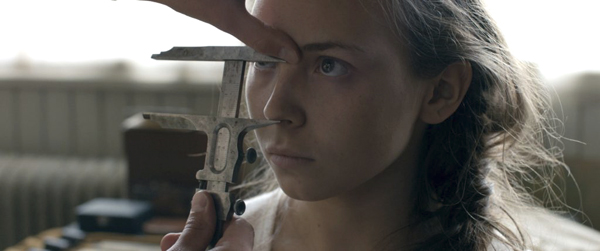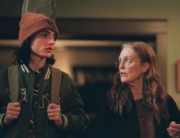Privilege. It’s a loaded word as we try to move from a whites-know-best world to a more open, fair, and accepting society. Privilege means more than just higher status: it means that the privileged never have to question their reality while forcing others of lower status to adapt to it. Two movies take on the concept of privilege from the outsider’s point of view in very different ways and epochs.
Beatriz at Dinner
Critics are hailing Miguel Arteta’s Beatriz at Dinner as the first salvo in cinema’s assault on 2017 Trump-era racism. Can it live up to the billing? Director Miguel Arteta and screenwriter Mike White stack the deck in favor of a Mexican-born heroine speaking truth to power, yet oddly undermine her at the same time.
Lonely massage therapist and New Age healer Beatriz (Salma Hayek, deglamorized and a little broad in the beam) arrives for an appointment at the Malibu mansion of longtime client Kathy (Connie Britton, nailing decent-but-clueless-rich-lady to the wall). Having once ministered to Kathy’s cancer-stricken daughter, Beatriz enjoys a position as a family friend, albeit one at arm’s length. When Beatriz’s old hooptie breaks down, Kathy invites her to stay for an important dinner party celebrating a deal that benefits evil tycoon Doug Strutt (John Lithgow). Strutt is a famous killer of big game, a proud polluter, and possibly a destroyer of Beatriz’s Mexican hometown—and the kind of guy who hits up any nearby brown-skinned person for a topper on his bourbon.
As dolled-up guests (including chortling Chloë Sevigny and Josh Duplass) arrive, an elaborate dance is about to go down where the pure and holistic will challenge the cravenly rapacious. Boundaries of loyalty and social class will undergo fraught tests, and as in Arteta’s Chuck and Buck, maximum awkwardness will be milked, partly to afflict the comfortable and partly to creep out the audience.
Arteta and White have West Coast social-climbing phonies down pat. It’s their main character who remains at an odd remove. As Kathy proudly says when introducing Beatriz, “Beatriz is a saint.” Problem is saints can be a bit of a bore. Hayek silently stares into some imaginary focus point, looking as though she is listening to divine music only she can hear (when Beatriz isn’t interrupting others and burbling rapturously about her New Age passions, that is). In Lithgow’s sharp performance as a shrewd, antic alpha male who gets off on his own villainy, Doug Strutt recalls Mark Twain’s remark that after death he’d pick heaven for the climate, hell for the company. Next to Beatriz, Strutt is a guilty pleasure.
Mocking upscale LA while reflecting some of its trendy gullibility, the movie unquestionably worships Beatriz’s “healing” powers. Some of us who dwell east of LA consider reiki, auras, and Rolfing a form of benign quackery rather than cures for actual ills and therefore may view Beatriz something less than a virtuous bringer of the light.
Beatriz gins up its ending with melodrama. But almost against its will, the film has forced viewers to consider privilege, its thoughtlessness and condescension. Of course, a middle ground might exist between Beatriz’s heartfelt lectures and Strutt’s gleeful evildoing, but in Beatriz at Dinner you won’t find it.
Sami Blood
Next to Beatriz, Sami Blood feels like a simpler, fresher—and sadder—account of the damage prejudice can do. At the film’s start, a tough old lady looks back on a youth she has tried to keep at bay, hiding her origins as a member of Sweden’s minority reindeer-herding Lapp population. Christina (née Elle Marje) was forced into a strict Sami boarding school that first punished the girl for her Lapp identity, and then refused to let her rise above it. No wonder the weary adult does not want to look back.
Piety, rote learning, and punishment rule the day at the school. A doctor measures Elle Marje’s head with a caliper and forces her to strip and be photographed in front of the class, an episode of burning shame. She cautiously approaches the one teacher who recognizes her academic talents, seeking a path to higher schooling, only to be rebuffed: “You people can’t get by in the towns…You’ll have to stay here or you’ll die out.” The school drives Elle Marje apart from more her more timid sister. A visit to a Swedes-only dance ends in a beating, and Elle Marje realizes she’s on her own. With no support and little knowledge of the outside world, she’ll have to strike out for a new life.
Beatriz has an uneasy, conditional rapport with the elite, from which she recoils; Elle Marje is excluded from mainstream Swedish life, which she struggles to join. That difference makes Sami an easier work to accept. Also, beautiful yet unfussy shots, natural rhythms, and a complex performance by Lena Cecilia Sparrok take the film above simplistic preaching. Sami Blood unfolds in a very particular environment, yet rings with universal moments: the excitement of first love, the fear of social ostracism, the sense of the abyss when a situation becomes untenable. It makes the point that racism humiliates and isolates. It creates a heroine who will be ravaged in time, but whom we can root for and respect in her youth. Lonely are the brave.








Leave A Comment